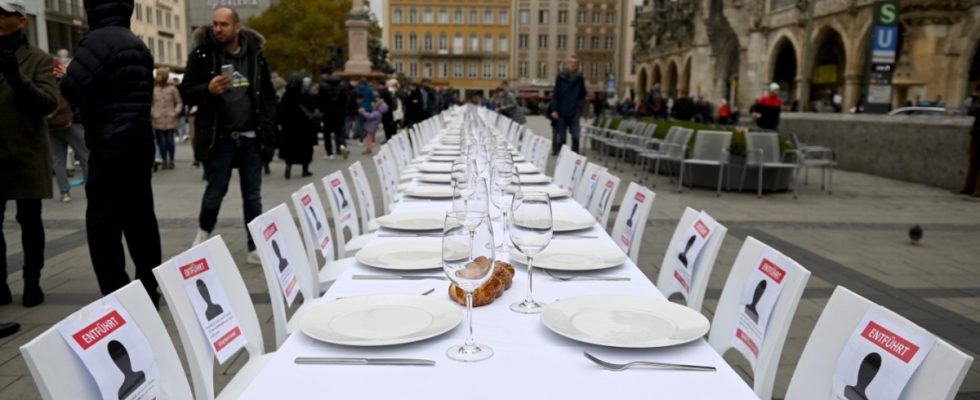The table on Marienplatz is as long as the town hall facade. Plates and wine glasses and chairs next to each other, all in white. There are some challah breads on the tables; they are traditionally baked for Shabbat. The rain creates small puddles on the plates. Some of them have these little canning jars that are often called baby jars. There are no normal chairs waiting in these places, but instead children’s high chairs. There are roses on two plates, one red and one white. Nobody sits on the chairs. Small posters are stuck to their backrests, each with a person’s name and photo. They were kidnapped from Israel and have been in the hands of Hamas for four weeks.
Alma Or, 13 years old, Alon Lulu, 26 years old, Hanna Peri, 79 years old, Liam Or, 18 years old, Raz Katz-Asher, four years old, Avigail Idan, three years old, Kfir Bibas, nine months old, Inbar Haiman, 27 years old , Keith Samuel, 64 years old, Aviv Katz-Asher, two years old, the Brodutch family, Hagar, Ofri, Yuval, Oria, four to 39 years old. There are many more names, there are 240 chairs. Name after name, picture after picture – “kidnapped.” Only a few chairs are missing names and photos; we don’t yet know all of the abducted people.
This Friday, on the empty Shabbat board, abstract numbers – 1,400 civilians killed by Hamas, hundreds kidnapped – become visible destinies. Many passers-by stop. The silent action was organized by two private individuals; ask them not to publish their names, for security reasons. The empty board is supported by the Israelite Community, and Yehoshua Chmiel, its vice president, is available for discussions.
How does he feel about the blank slate? He now suddenly understands, he says, what must have happened in 1933. Today people often ask: How could it happen? Even back then, not everyone became Nazis overnight. But most of them remained silent and did nothing; they lacked empathy. And today? What the Jewish community is experiencing in terms of hatred and attacks is worse than anything since the Nazi era, says Chmiel. “I feel let down.” Abandoned by a large part of the population. He gives two figures: Shortly before the state elections, 35,000 people protest against the right; A few days after Hamas’ massacre of Israeli civilians, 2,000 people are showing solidarity with Israel.
As someone “who has to be politically active” – yes, has to because he is a Jewish German – he is currently observing how the seeds of those who have been fomenting anti-Semitism for decades are sprouting. Again the majority is silent. “Anyone who believes that it only affects the Jews will wake up tomorrow.” Democracy and liberality are in danger, says Chmiel. When he sees and hears that people who are otherwise committed to climate protection, the rights of black people or the queer community are aligning themselves with anti-Semites, it really disturbs him, says Yehoshua Chmiel. “We have to stand up, show moral courage and stand up for the ideals and life plans that we have.”
The rain sticks the blankets to the tables like skin and the glasses begin to fill. At one end of the table there is a chair at the head. It belongs to Shani Louk, she was missing for weeks. Her family now knows that the terrorists murdered the 22-year-old.

